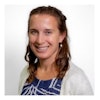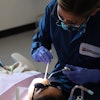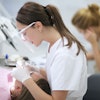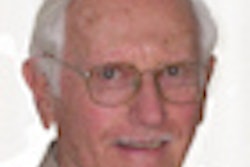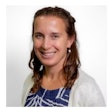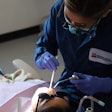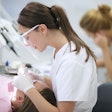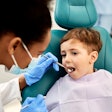
The W.K. Kellogg Foundation has announced a $16 million initiative to help coalitions in five U.S. states develop dental therapist programs similar to a controversial midlevel provider model now being used in Alaskan tribal communities.
The Dental Therapist Project would support community-based drives in Kansas, New Mexico, Ohio, Vermont, and Washington geared toward adding therapists to dental teams providing care in underserved areas. The push is being described as part of a larger effort to address severe shortages of care in thousands of communities nationwide.
"It is time now for more states and tribal nations to seriously consider new and proven approaches -- such as the dental therapist model -- as a way to bring critically needed oral healthcare services to vulnerable children and families," said Sterling Speirn, president and CEO of the W.K. Kellogg Foundation. "Oral health is essential to overall health, yet good, regular oral healthcare is out of reach for far too many people in this country."
With support from Kellogg, groups in each state will work to develop therapist programs tailored to meet local needs, said Dental Therapist Project Director David Jordan of Community Catalyst, a national nonprofit advocacy organization that is the project's lead grantee.
"Too many communities cannot get care because they cannot afford it and there are no providers in their community," Jordan said. "To meet the nation's unmet oral health needs, we need to extend the reach of dental care to underserved communities by adding new members to the dental team."
Addressing a critical need
The dental therapist model first began in the 1920s in New Zealand and is now well-established in many developed countries, including the U.K., Australia, and the Netherlands.
In the U.S., dental therapists receive two years of intensive technical training and provide a range of services, including preventive and restorative procedures and simple extractions. They work under the general supervision of an offsite dentist, who preapproves the care they provide and reviews their work by telephone, fax, and Internet.
“It's time to think about different solutions.”
— Shannon Cotsoradis, Kansas Action
for Children
Pam Blackwell, oral health access advocacy project director at Health Action New Mexico, is convinced dental therapists would be a welcome addition to larger dental teams in New Mexico, where 2,000 people recently waited in line and camped out in hopes of getting free care at a two-day Mission of Mercy dental clinic.
"The rural and tribal communities are eager for this kind of provider," she said, noting that a dental therapist program would offer local people the chance to learn new skills and provide their rural communities with culturally competent care. "The dental therapist is really an extension of the dentist, extending the dentist's reach to the wider community."
At least 49 million people are currently living in more than 4,000 areas across the U.S. that lack adequate oral healthcare providers, according to the U.S. Department of Health and Human Services Health Resources and Services Administration (HRSA). It would take nearly 10,000 additional dental practitioners to meet the need for care in these dental health provider shortage areas, according to HRSA's calculations, which are based upon a population-to-practitioner ratio of 3,000:1. The shortage of oral healthcare providers disproportionately affects people living in poor and rural communities, according to health officials. Millions more Americans lack dental insurance or other means of paying for care.
In Kansas, "we have 14 counties with no dentists and 91 dental health provider shortage areas," said Shannon Cotsoradis, president of Kansas Action for Children, a group that is working to get a dental therapist program started in that state.
"Kansas doesn't have a dental school," she added, and in an era of financial difficulty, the prospects for getting one seem dim. She acknowledges work lies ahead. Legislation must be crafted, and some in the state's dental establishment must be won over. Yet Cotsoradis believes action must be taken. "It's time to think about different solutions," she said.
ADA, AGD opposition
The ADA, joined by several other specialty dental groups, has long worked to prevent states from implementing dental therapist programs, asserting that the therapists are not qualified to perform procedures considered irreversible or "surgical," such as drilling or extracting teeth.
“The ADA welcomes the Kellogg Foundation to the fight to improve the oral health of the millions who suffer from its lack," said ADA President Raymond Gist, DDS, in a statement issued by the ADA today. "Unfortunately, the foundation’s recent efforts to address this complex issue focus exclusively on expanding a single provider model, the controversial Alaska DHAT. The limited research evaluation conducted by Kellogg did not provide the robust examination or projectable metrics on which to base such important policy and public health decisions.
“No matter where you stand on the issue of non-dentists performing dental surgery -- and we stand firmly against it -- limiting the approach to overcoming the many access barriers to promoting this one workforce model ignores numerous, and we believe much greater, barriers to care. Frankly, these energies and resources would be better directed toward improving existing programs."
The Academy of General Dentistry (AGD) is also opposed to the DHAT model as a singular solution.
“Supporters of independent mid-level providers often claim that this is a turf war, but in reality, we dentists are obligated to ensure the health, safety, and welfare of our patients and all those we serve,” said AGD President Fares Elias, DDS, JD, in a statement released today also.
A mid-level provider only a few years removed from high school does not have the education and experience to deal with complications and emergencies that may or could arise while a patient is being treated, he added.
The AGD sees the creation of independent mid-level providers ultimately leading to the establishment of a two-tiered oral health care system. “It is unconscionable that a respected organization like Kellogg would be advocating that the poor -- especially the minority poor -- and the geographically disadvantaged would be subjected to second-class care from non-dentists,” said Dr. Elias.
Others remain convinced that dental therapists are worth a try. Such providers could help get care for 850,000 people living in underserved areas of Ohio, said David Maywhoor, project director of Dental Access Now at the Columbus-based Universal Health Care Action Network.
"It's a matter of making sure that access to care is provided to people in the remote areas of the state, in places where the traditional dentist is not going to open up a shop," Maywhoor said.
In Alaska, the first dental health aide therapists (DHATs) began providing care in 2005 as part of the longstanding federally authorized Community Health Aide Program that trains residents of Alaska Native tribal villages to provide primary medical care to their neighbors. From the start, the ADA vehemently opposed the DHAT program and sued to stop its implementation in Alaska, arguing that it violated state laws that govern the licensing of dental professionals.
The therapists, however, practice under the authority of the Indian Health Care Improvement Act, and in 2007, an Alaska Superior Court found that the federal law had precedence over state licensing regulations. In 2009, Minnesota enacted a law authorizing dental therapists to practice and students are now in training. The model is also being explored in other states, including California, Connecticut, New Hampshire, and Maine.
Support growing
While the ADA has attacked the therapist model, other dental organizations have spoken out in support, saying that therapists should be considered in light of public health needs. Currently, more than a dozen DHATs are working in Alaska Native communities, four more are completing 400-hour preceptorships under the direct supervision of dentists, and another 13 are in training.
In October, the first major independent evaluation of the Alaskan DHATs found the midlevel providers were offering safe and competent care. The two-year evaluation, conducted by RTI International, a nonprofit research institute, assessed the work of therapists in five Alaskan communities. The study was funded by the W.K. Kellogg Foundation, the Rasmuson Foundation, and the Bethel Community Services Foundation.
The evaluation's findings were dismissed by the ADA but applauded by the American Dental Hygienists' Association (ADHA), which said the research offered evidence that restorative services can be successfully administered by nondentist providers. The ADHA, which had no immediate comment on the announcement of the Kellogg Foundation's Dental Therapist Project, has been promoting ways to expand the practice capacity of the nation's 150,000 dental hygienists.
Meanwhile, the ADA has offered its own new dental auxiliary model, a community dental health coordinator who would provide a limited range of preventive services, such as screenings and fluoride treatments, and help patients navigate the health system.
In Vermont, expanded-function dental assistants who can place restorations and "Tooth Tutors" who specialize in locating dental homes for children are already helping to expand care, said Peter Taylor, executive director of the Vermont State Dental Society, which has not taken a position on the Dental Therapist Project.
But Carlen Finn, executive director of Voices for Vermont's Children, said that many residents are still in need of care that therapists could provide.
"Despite several Vermont programs targeting access to dental care, too many in Vermont lack access to care because they cannot afford the cost of care or they have limited access to dentists," she said. "In 2009, more than 62,000 Vermonters -- both insured and uninsured -- reported not getting dental care because they could not afford it. By adding a dental therapist to the dental team, Vermont will be taking a key step toward its goal of greatly improving access to dental care."
Copyright © 2010 DrBicuspid.com
